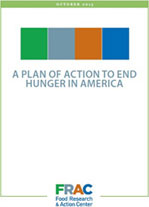Federal Nutrition Programs Are Among Gateways for Internet Service Discounts
Supplemental Nutrition Assistance Program (SNAP) participants are among those categorically eligible for discounts of up to $30 per month toward internet service. They also can “receive a one-time discount of up to $100 to purchase a laptop, desktop computer, or tablet from participating providers if the household contributes more than $10 and less than $50 toward the purchase price.”
The discounts are provided for households with lower incomes through the new federal Affordable Connectivity Program (ACP). In addition to households with a member participating in SNAP, ACP-eligible households also include those with a member eligible for the National School Lunch Program or National School Breakfast Program , and those in receipt of the Special Supplemental Nutrition Program for Women, Infants, and Children (WIC), Medicaid, SSI (Supplemental Security Income), Pell grants, federal housing assistance, or Lifeline. Households participating in the Food Distribution on Indian Reservations Program (FDPIR) or certain other tribal programs are also ACP-eligible; such households on tribal reservations can receive ACP internet discounts of up to $75 a month.




